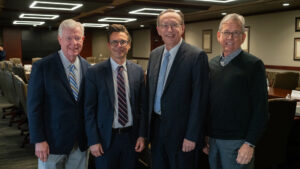
RIDGECREST, N.C. (BP)–Stereotypes often hinder honest dialogue about the influence of Reformed theology in Southern Baptist life, participants were told at a Nov. 26-28 conference on Calvinism and the SBC.
The three-day gathering was co-sponsored by Founders Ministries and Southeastern Baptist Theological Seminary and held at LifeWay Ridgecrest Conference Center in North Carolina. Founders Ministries formed in 1982 to advance Reformed theology in SBC churches.
When organizers began planning for the “Building Bridges” event, they hoped that misunderstandings would be dispelled, said Thom Rainer, president of LifeWay Christian Resources.
“We prayed that biblical and theological positions would be presented clearly, that truth and God’s Word would be so clearly presented that we would understand it,” he told the 550 conference participants. “We prayed that we would deal with misperceptions, stereotypes and caricatures.”
Charles Lawless, dean of the Billy Graham School of Missions, Evangelism and Church Growth at Southern Baptist Theological Seminary in Louisville, Ky., addressed four stereotypes about non-Calvinists that hinder understanding:
–- “Non-Calvinists are more concerned about numbers than theology.” In a denomination that uses numbers to evaluate progress and in which many churches are theologically weak, this claim could be made about most Southern Baptist churches, regardless of their position on Calvinism, Lawless said. While all Southern Baptists ought to be concerned when churches dilute the Gospel message in the name of contemporary outreach, they also are right to be concerned that some Southern Baptists never ask the numerical questions and seem to rest on their theology even as their churches reach nobody for God’s glory.
–- “Non-Calvinists promote pragmatic church growth.” If a person reads books written by church growth experts, it is easy to see why the pragmatism of that movement would be questioned. Critics of the church growth movement, however, sometimes use extreme examples to unfairly criticize the entire movement, Lawless said. Contextualizing a presentation of the Gospel to fit a listener’s culture is not the same thing as pragmatism, he said, and critics must be careful not to confuse them.
-– “Non-Calvinists used faulty approaches to evangelism and are unconcerned about regenerate church membership.” Southern Baptists should be concerned about poor approaches to evangelism, but not all uses of gospel tracts, invitations and calls to decision should be automatically dismissed. The founder of the church growth movement, Donald McGavran, clearly tied evangelism to discipleship and responsible church membership, Lawless said.
–- “Non-Calvinists do not like Calvinists.” It is not Calvinism or Calvinists that concern many non-Calvinists, but rather the accusation made by a few Calvinists that non-Calvinists are less than gospel preachers because they do not accept the five points of Calvinism, Lawless said.
Nathan Finn, instructor of church history at Southeastern Baptist Theological Seminary in Wake Forest N.C., spoke to four myths about Calvinists:
–- “Calvinism is a threat to evangelism.” While there is little doubt that Southern Baptist Calvinists are not as evangelistic as they should be, that only makes them similar to everyone else in the Southern Baptist Convention, Finn said. In fact, many prominent Southern Baptist Calvinists have been very active in promoting evangelism. One of the first actions taken by R. Albert Mohler Jr., a prominent Calvinist, when he became president of Southern Seminary, was to establish the Billy Graham School of Missions, Evangelism and Church Growth.
-– “Southern Baptist Calvinists are opposed to invitations.” While some Calvinists are uncomfortable with the “easy believism” of some altar calls, they are not opposed to public invitations if it is made clear that walking the aisle and praying a prayer are not the same thing as regeneration and repentance, Finn said.
-– “Calvinism is more or less equivalent to hyper-Calvinism.” The latter is an aberrant view of Calvinism that embraces several doctrines that genuinely stifle evangelism, Finn said. Contemporary Southern Baptist Calvinists uniformly reject hyper-Calvinism as a perversion of the doctrines of grace and are regularly frustrated that so many non-Calvinists confuse the two movements.
-– “Authentic Baptists are not Calvinists.” Whether or not Calvinism is biblical is a point worthy of debate, but the influence of Calvinism among Baptists in general and Southern Baptists in particular is a matter of historical record that cannot be disputed, Finn said. Far from being semi-Presbyterians, Southern Baptist Calvinists have been defenders of Baptist distinctives.
Finn said bridges can be built between Calvinist and non-Calvinist Southern Baptists through common commitments to the Gospel, historical Baptist distinctives, laboring together in the Great Commission and an attitude of loving humility.
“The Calvinism issue is not going to go away, so Southern Baptists must be willing to openly discuss and debate the doctrines of grace in an effort to be biblically accurate and, just maybe, come to a greater theological consensus in the years to come,” Finn said. “If we are to move toward a more cooperative future, we must all be committed to defending and commending our particular convictions, but never at the expense of either our cooperation with each other or our personal sanctification.”
-–30–-
Mark Kelly is a freelance writer based in Gallatin, Tenn. Audio podcast downloads of all the presenters at the “Building Bridges: Southern Baptists and Calvinism” conference are available at www.lifeway.com/insidelifeway.
















